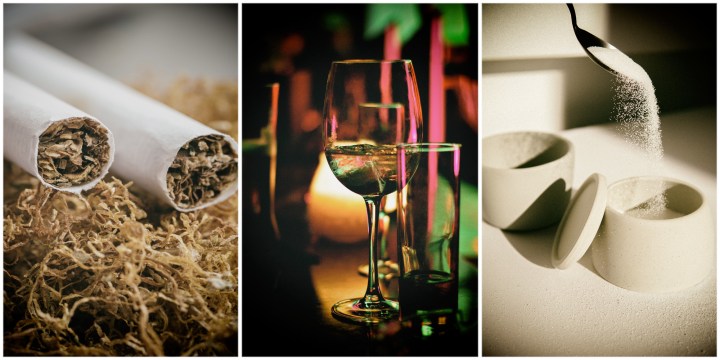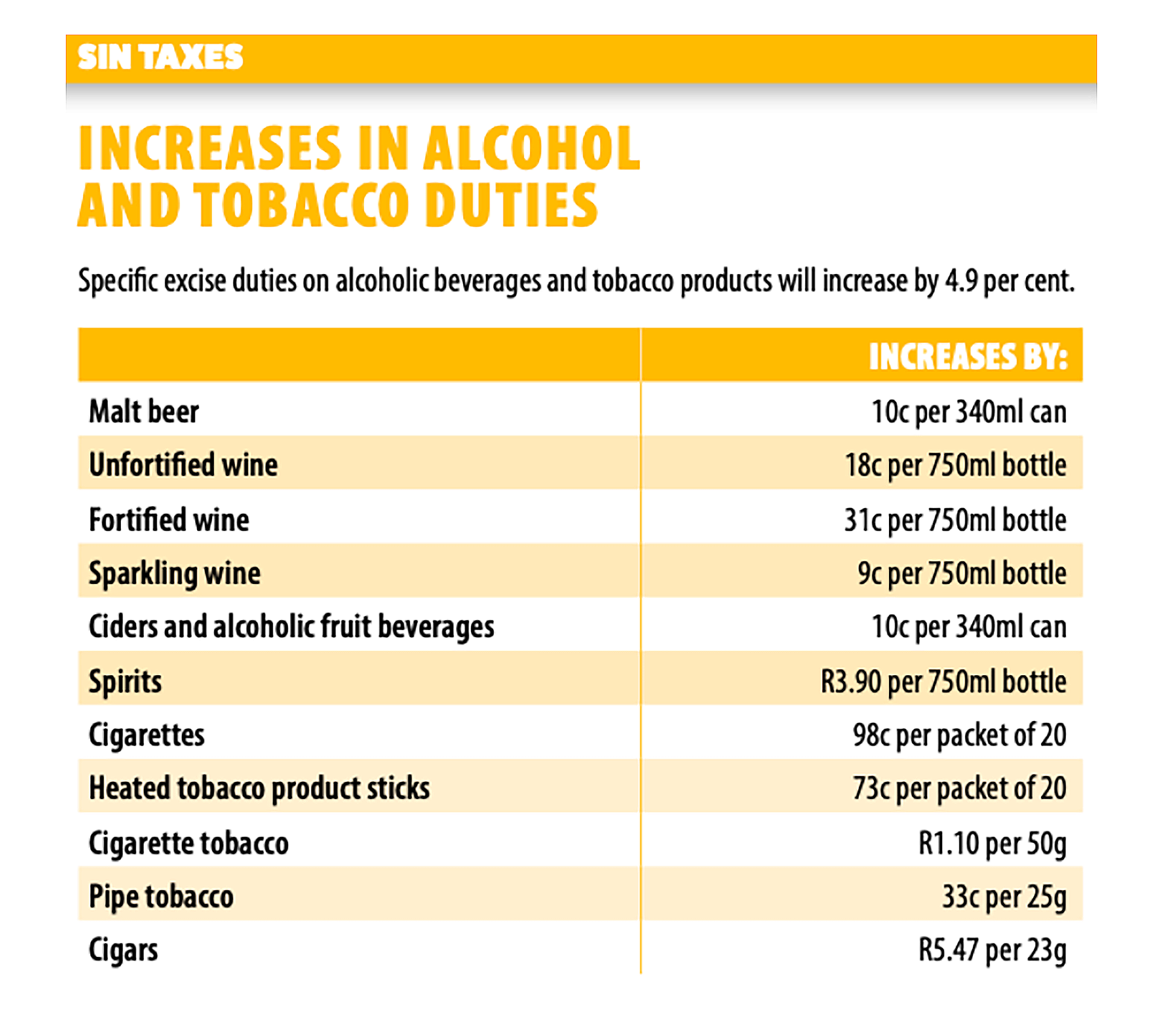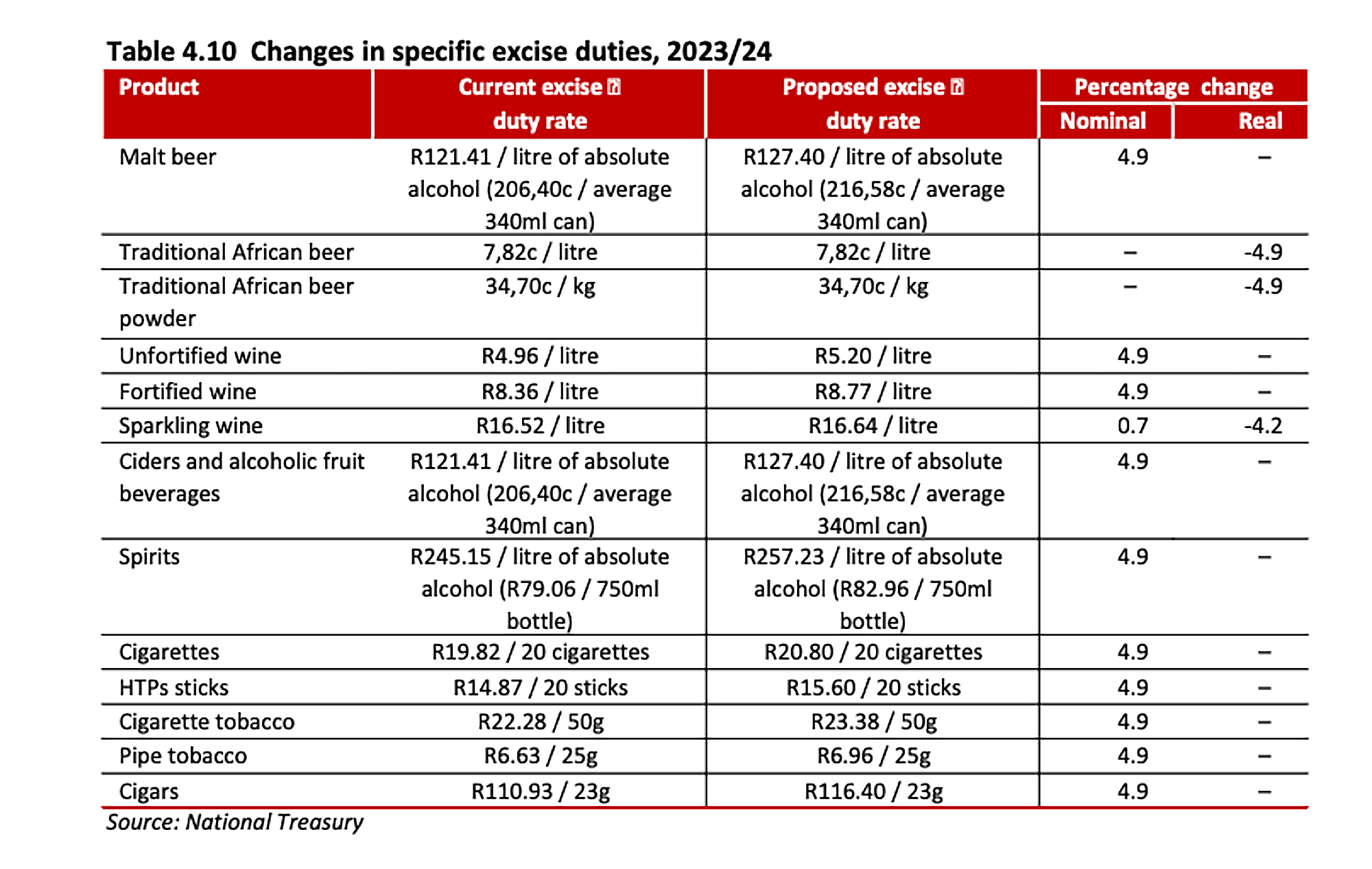BUDGET 2023
Sugar industry thrown a sweetener, but sobering news for sin taxes

The Finance Ministry hikes taxes on tobacco and alcohol, while the sugar sector catches a break.
Tobacco products and alcohol have just become almost 5% more expensive but the Finance Ministry has thrown a lifeline to the sugar industry by not increasing the sugar tax.
Excise duties on alcohol and tobacco have increased in line with expected inflation of 4.9%, with the rate for sparkling wine pegged at 3.2 times that of natural unfortified wine.
Tax on heated tobacco products will increase from R14.87 for 20 sticks to R15.60.
However, vaping products, which are arguably not much healthier than cigarettes, remain untaxed.
Also known as the Health Promotion Levy (HPL), the tax on sugar-sweetened beverages is about 2% per gram of sugar per 100ml.
Health activists argue that the levy is too low to have a substantive impact on health outcomes, while the sugar industry says the introduction of the levy in 2018 exacerbated a decline in the sector, with the industry losing revenue to the tune of about R1.2-billion per season.
The South African Sugar Association (SASA) said that over the past 20 years annual sugar production has declined by nearly 25%, from 2.75 million to 2.1 million tons. Over this period the industry also lost 60% of sugarcane farmers and related jobs have declined by 45%. Add to that the closure of two mills in KwaZulu-Natal, which cost thousands their jobs and stripped R2.05-billion in value from the sector.
Then there was the civil unrest of 2021 – which cost growers more than R100-million in revenue – floods, rising input costs and the rising cost of living exacerbated by Russia’s war in Ukraine.
The industry has lost about R4.8-billion in revenue since the introduction of the HPL.
SASA said on 3 February: “The damage to the sugar industry has been catastrophic: an estimated 16,000 direct jobs were jeopardised, impacting some 90,000 people’s livelihoods.”
The association has called for a three-year moratorium on an increase in the HPL, saying: “Any increase of the HPL and lowering of the current threshold pose a big threat to the very continued existence and survival of the industry – it would devastate the industry and mean the end of the sector as we know it.”
A moratorium on the HPL would allow the industry to explore product diversification opportunities and represent the “fairest way” of achieving a just transition in the sugar sector into new activities and industries, such as sustainable aviation fuel, bioplastics and food additives.
Diversification in the sector will also benefit the economy and have a 1:10 multiplier effect on job creation, it says.
Reuters reports that the South African sugar industry risks losing as much as 16% of its cane-growing area and more than a 10th of farm-level jobs if the government raises the HPL and expands the tax to other products, such as fruit juices.
As much as 53,800 hectares of cane-growing land and 9,151 jobs may be lost by 2031 if the HPL was raised and expanded, according to a paper by the Bureau for Food and Agricultural Policy, for SASA, which was published last month. The industry is facing a crisis partly due to a flood of cheap imports.
The government has raised about R2.3-billion – R37-million from import duties – from the HPL on sugar-sweetened drinks in the fiscal year through March 2022.
HEALA, a civil society health coalition, has long called for a hike in the HPL and for it to be extended to other products.
Eunice Montso, project assistant at HEALA, said further increases to the levy are needed for it to remain effective.
Montso said that while the levy has pushed billions into the state’s coffers, it is not ring-fenced and Treasury has not shown any evidence of using the money to help with food availability and healthy food issues.
Visit Daily Maverick’s home page for more news, analysis and investigations
“Ideally, it would be ring-fenced to help with, for instance, subsidising for communities with purchasing healthy foods or maybe having things like food vouchers where people can use those vouchers and actually buy healthy food.”
Fruit juices are currently exempt from the tax, but Heala said this should change.
The alliance has called on Treasury to increase the tax to 20% per litre of the sugary drink; to lower the threshold from 4g to 2g of sugar content per 100ml; and expand its defined sugar-sweetened beverages to include fruit juices.
Alcohol and tobacco are easier targets for the government, as the so-called “sin” taxes are raised each year and 2023 is no different, and Finance Minister Enoch Godongwana has raised excise duties on alcohol and tobacco in line with expected inflation of 4.9%.

The guideline excise tax burdens for wine, beer and spirits are 11%, 23% and 36% respectively, of the weighted average retail price. Bubbles always cost more: The rate for sparkling wine is pegged at 3.2 times that of natural (unfortified) wine.
Traditional African beer and beer powder remain unchanged at 7.82c/litre.

This week, the beer industry called for “fairer” implementation of the excise tax on taxable alcohol products.
The Beer Association of South Africa said the government’s policy of taxing beer on an excise duty based on litres of absolute alcohol and/or alcohol by volume (ABV) is unfair because other alcoholic beverages, such as wine, are taxed per litre regardless of their alcohol volume.
BASA said that while the industry was still recovering from the impacts of the pandemic, rolling blackouts have caused a decline in production of up to 40% but costs have risen by 15%.
“This loss of brewery income has forced some businesses to lay off workers, with many craft brewers indicating that they will not be able to continue operating if load shedding continues at current levels.” BM/DM




















 Become an Insider
Become an Insider
A decline in the sugar industry is to be welcomed. It is environmentally destructive, and causes havoc to human health. We have an epidemic of obesity and diabetes in South Africa.